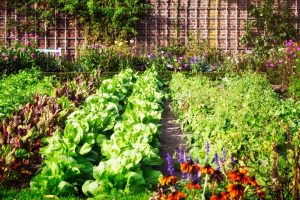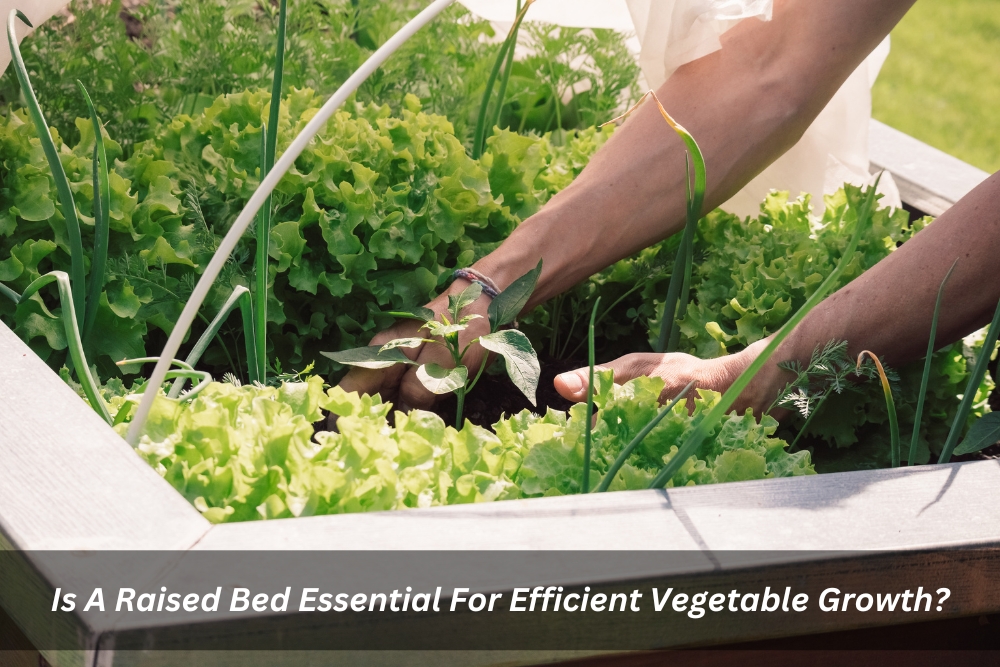The allure of a raised bed for vegetables is undeniable. They promise order, warmth, and bountiful harvests, all within neat, elevated borders. But for the efficiency-minded gardener, a crucial question remains: can a raised bed be the key to unlocking their limited vegetable garden’s full potential? Buckle up, green thumbs, as we dig into the dirt on this popular trend and explore whether raised beds truly deserve a permanent spot in your vegetable patch. Will they be the hero your garden needs, or just an unnecessary layer of wood and soil? Let’s find out!
What are raised beds and how do they function?
Imagine a garden bed elevated above the ground, often enclosed by wood, stone, or other materials. That’s a raised bed! This simple design offers several advantages:
- Improved drainage: Raised beds sit above the natural soil, preventing waterlogging and promoting healthy root development.
- Warmer soil: The raised structure absorbs more sunlight, leading to earlier soil warming and faster seed germination in spring.
- Better soil control: You can fill raised beds with high-quality soil mixes, avoiding the limitations of your native soil.
- Reduced weeds: The raised barrier helps control weeds and pests, making maintenance easier.
When should you consider using raised beds for your vegetables?
Raised beds aren’t a one-size-fits-all solution, but they shine in specific situations:
- Poor soil quality: If your existing soil is compacted, clay-heavy, or lacking nutrients, raised beds offer a chance to start fresh in a controlled environment.
- Limited space: Raised beds maximise vertical space, allowing you to grow more vegetables in a smaller area.
- Specific crop needs: Some vegetables, like herbs and root crops, benefit from the loose, well-draining soil of a raised bed. These beds can also help with pest control, as the raised structure and controlled environment can deter some pests and diseases.
- Accessibility: Raised beds are easier to access for gardeners with limited mobility, reducing bending and strain.
Can you achieve efficient vegetable growth without raised beds?
Absolutely! Traditional in-ground gardens can be just as productive if you manage them well. Here are some alternatives:
- Improve your soil: Amend your existing soil with compost, organic matter, and cover crops to enhance its quality and drainage.
- Hügelkultur: This raised bed method uses logs and branches to create a self-composting mound, providing warmth and nutrients.
- Container gardens: Grow vegetables in pots or raised containers, ideal for balconies, patios, or limited space.

How do raised beds impact vegetable growth and efficiency?
Studies have shown that a raised bed can positively impact vegetable growth and yield. Here’s how:
- Faster growth: Warmer soil and better drainage lead to earlier germination and faster plant development.
- Increased yield: Improved root growth and nutrient availability can translate to higher vegetable yields.
- Reduced pest and disease: The raised structure and controlled environment can help deter some pests and diseases.
Additionally, raised beds promote efficient water use due to their improved drainage. For further tips on sustainable irrigation methods specifically tailored to raised beds, check out ‘Can Sustainable Irrigation Enhance Your Landscaping Design?’
Is there a “Right” choice? Comparing raised beds to traditional gardens:
There’s no single “right” answer! Consider these factors:
Raised beds
- Pros: Improved drainage, warmer soil, better soil control, reduced weeds, easier access.
- Cons: Initial cost, higher water needs, potential for faster soil depletion.
Traditional gardens
- Pros: Lower cost, established soil microbiome, potentially larger growing area.
- Cons: Soil quality limitations, poorer drainage, potentially harder maintenance.
Ultimately, the best choice depends on your individual needs, budget, and gardening style.
Beyond efficiency: Additional benefits of raised beds for vegetables
Raised beds offer more than just efficient vegetable production:
- Aesthetics: They create neat, organised gardens, adding beauty and definition to your outdoor space.
- Accessibility: Raised beds are easier to access for gardeners with physical limitations.
- Pest deterrence: The raised structure can help deter some pests like slugs and rabbits.
- Vertical gardening: You can use a raised bed for vertical gardening, growing climbing vegetables like beans and cucumbers.
How to get started with raised beds for your vegetables:
Ready to give raised beds a try? Here’s a basic guide:

- Plan your size and location: Choose a sunny spot and determine the size based on your needs and available space.
- Select your materials: Choose wood, stone, bricks, or other materials for the frame.
- Build your frame: Follow simple construction plans or hire a professional.
- Fill your bed: Use a high-quality raised bed mix containing compost, manure, and other organic matter.
- Plant your vegetables: Choose varieties suited to your climate and raised bed conditions.
Conclusion
Raised beds can be a valuable tool for efficient vegetable gardening, but they’re not a magic bullet. Whether you choose raised beds, traditional gardens, or a combination, the key to success lies in understanding your soil, choosing the right plants, and providing proper care. So, get out there, experiment, and discover what works best for you! Remember, a bountiful harvest isn’t just about the bed itself, but also about the gardener’s skills and knowledge. If you’re feeling overwhelmed by the process of planning, building, or maintaining your raised beds, don’t despair! A Bargain Gardener can be your secret weapon.
We offer affordable solutions that won’t break the bank. We believe everyone deserves the joy and satisfaction of growing their own food, and we’re here to help make that happen. Contact us today for a free consultation and let’s discuss how we can turn your vegetable-growing dreams into a delicious reality!
P.S. We also offer a wide range of other landscaping services to enhance your outdoor space, from patios and walkways to garden maintenance and irrigation systems. Let us help you create a beautiful and functional outdoor haven you can enjoy year-round.


